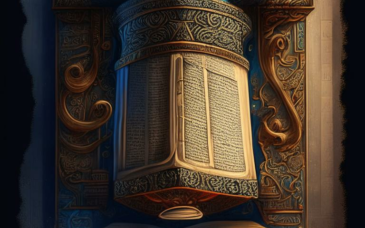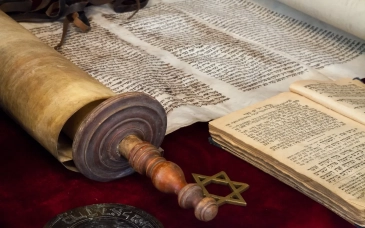Chapter Seven
This chapter discusses prophecy and who warrants it, and explains the difference between the prophecy of Moses and that of the other Prophets.
1) One of the bases of religion is to know that God visits people in prophetic visions, which come only to exceedingly wise people of outstanding characteristics, whose inclinations never lead them to earthly matters but who always conquer their inclinations, and who are of correct temperaments. A person who fulfils these criteria, and is of perfect health, will, when studying esoterical philosophy and is attracted by those elevated issues and is of an appropriate temperament to understand and comprehend them , and sanctifies himself by moving away from anybody who concerns himself with ephemeral matters, and encourages himself not to have any thoughts about useless matters and its contrivances, have his thoughts permanently attuned to above, from under God's Throne, to understand the pure and holy forms, and looks upon the wisdom of God [in Creation] in its entirety, from the first form [i.e the Holy Chayot] till the centre of the Earth, and sees in them God's greatness, and then prophecy will immediately come to him. At the time when prophecy comes to him, his soul will be on the same level as that of the Ishim angels, and he will become a different man, and he will realise that he is not [any more] as he was, but will rise above the level of other wise men, as it is written, "...and you shall prophesy with him, and shall be turned into another man".
2) There are [many] levels of prophecy - in the same way that one person can be wiser than another, so can he be more prophetic. Prophetic insights come only in nocturnal visions in dreams, or by day after falling asleep, as it is written, "I the Lord make Myself known to him in a vision, and speak to him in a dream". Whenever one is receiving a prophecy, one's limbs shake, the strength of one's body weakens, and one's thoughts become disturbed, leaving one's mind free to understand what one will see, as it is written in connection with Abraham, "...and, lo, a horror of great darkness fell upon him", and as it is written in connection with Daniel, "...for my comely appearance was horribly changed, and I retained no strength".
3) What is made known to a prophet during prophecy is done so by way of parable, and he will immediately realise what the parable means. For instance, when Jacob the Patriarch saw the ladder with angels ascending and descending it, it was a parable representing monarchy and its subjection. Similarly, the animals which Ezekiel saw, the boiling pot and almond tree which Jeremiah saw, and all the other objects seen by the other Prophets were also parables. Of the Prophets, some, like those mentioned above, related what they saw in their prophecy and their interpretation of it, whereas some related just their interpretation. Sometimes they related just the parables [of the prophecy], like Ezekiel and Zachariah sometimes did. All of the Prophets prophecised by way of parables and riddles.
4) None of the Prophets receive prophecies whenever they wanted, but they would attune their thoughts, be happy and of a good heart, and seek solitude, for prophecy does not come to those who are sad or lazy, but only to those who are happy. Therefore, the sons of prophets would have before them harps, drums and flutes, and would seek prophecy, as it is written, "...and they shall prophesy", that is to say that they will follow the ways of prophecy until they prophecise, progressing as they go.
5) Those who seek prophecy are called the sons of prophets. Even though they attune their thoughts, the Divine Presence may, or may not, inspire them.
6) All the Prophets, from the first to the last, prophecised in these ways, with the exception of Moses our Teacher, chief of the Prophets. In what ways did Moses differ from the other Prophets? Firstly, whereas the other Prophets received their prophecies in a dream or vision, Moses received his while awake and standing, as it is written, "And when Moses was in the Tent of Meeting to speak with Him, he heard the voice speaking to him, et cetera". Secondly, the other Prophets received their prophecies via an angel. Therefore, what they saw was by way of parable and riddle. Moses, on the other hand, did not receive his prophecies via an angel, as it is written, "With him I speak mouth to mouth", "And the Lord spoke to Moses face to face", "...and the outward appearance of the Lord does he behold"7, that is to say that what Moses saw what not by way of parable, but he saw each prophecy absolutely clearly without any parables or riddles. The Torah said about him, "...manifestly, and not in dark speeches"7, showing that when Moses received a prophecy he did not do so by way of riddles, but did so with clarity, and saw everything absolutely clearly. Thirdly, the other Prophets were scared [of their prophetic visions] and would shy away, but Moses wasn't and didn't. Scripture says, "...as a man speaks with a friend"8 - just as a man is not scared to listen to his friend, so Moses had the capabilities to understand his prophecies and to stand unafraid. Fourthly, none of the Prophets prophecised whenever they wanted to, but whenever God wanted to He would visitate Moses and bestow upon him prophecy. Moses did not have to attune his thoughts or otherwise prepare himself, for the reason that he was always prepared and stood like a ministering angel. Therefore, he would receive prophecies at any time, as it is written, "Stand still and I will hear what the Lord will command concerning you". In this God trusted him, as it is written, "Go say to them, `Return to your tents'. But as for you, stand here by Me, and I will speak to you, et cetera". From here we see that whenever any of the other Prophets had finished prophecising they would return to their houses [and families] and other bodily needs, like everybody else, so they therefore did not separate themselves from their wives. Moses, on the other hand, did not return to his home, and separated himself from his wife, and all that resembled her, for ever. His mind was [always] connected to God, and God's glory never left him at all; light emanated from his face, and he was holy like an angel.
7) It is possible for the prophecy of a prophet to be for him alone, to widen his outlooks and to increase his knowledge so that he will not know what he [previously] did not know from these great matters. It is also possible that he has to deliver the prophecy to one of the nations of the world, or to the people of a [particular] town, or to the citizens of a nation, [in order] to teach them wisdom, and to let them know what to do, or to prevent them from doing [again] any bad deeds. When a prophet is sent [by God] on such a mission, he is given a sign and proof [to present], so that people will know that God [really] sent him in truth. not everyone who presents a sign and proof is believed as a prophet, but only those people who are known to be suitable to receive prophecies on account of their wisdom and actions, and that they went in the ways of prophecy in its holiness and exegeses. When such people present a sign and proof and say that God sent them, it is a commandment to listen to them, for it is written, "...to him you shall listen". It is possible that although a person presents a sign and proof he is not a prophet, and the sign could be achieved by other means; even so, we are commanded to listen to him; because he is a great and wise man who is suitable to receive prophecy, we assume that his prophecy is true. In this we have commanded, just as we have been commanded to decide a verdict according to the testimony of two people who are eligible to bear testimony [together], even though they may be lying; since they have always been honest in the past, we assume that they being honest now as well. About this and similar matters it is written, "The secret things belong to the Lord our God, but those things which are revealed belong to use and to our children for ever, that we may do all the words of the Torah", and it is also written, "...for a man looks on the outward appearance, but the Lord looks on the heart".

